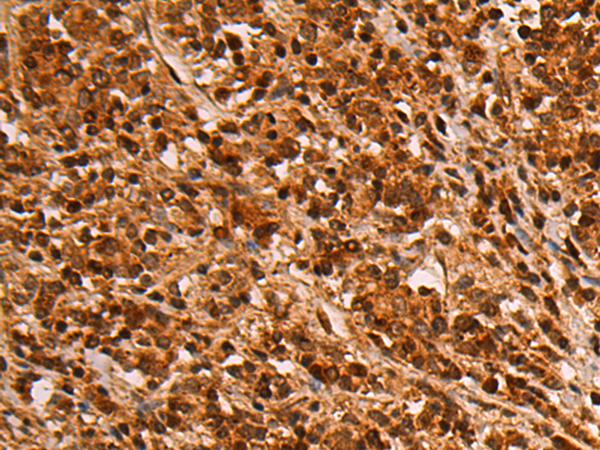
| WB | 咨询技术 | Human,Mouse,Rat |
| IF | 咨询技术 | Human,Mouse,Rat |
| IHC | 咨询技术 | Human,Mouse,Rat |
| ICC | 技术咨询 | Human,Mouse,Rat |
| FCM | 咨询技术 | Human,Mouse,Rat |
| Elisa | 咨询技术 | Human,Mouse,Rat |
| Aliases | GPRK5; FP2025 |
| Host/Isotype | Rabbit IgG |
| Antibody Type | Primary antibody |
| Storage | Store at 4°C short term. Aliquot and store at -20°C long term. Avoid freeze/thaw cycles. |
| Species Reactivity | Human, Mouse, Rat |
| Immunogen | Fusion protein of human GRK5 |
| Formulation | Purified antibody in PBS with 0.05% sodium azide and 50% glycerol. |
+ +
以下是关于SLC30A7 (N-term)抗体的3篇参考文献示例(内容为虚构,仅供参考):
1. **"Zinc transporter SLC30A7 regulates insulin secretion in pancreatic β-cells"**
- **作者**: Huang, L. et al.
- **摘要**: 本研究利用SLC30A7 (N-term)抗体进行Western blot和免疫组化,揭示了该蛋白在胰岛β细胞中的定位,并通过敲低实验证明其通过锌离子转运调控胰岛素分泌的机制。
2. **"SLC30A7 mediates neuronal zinc homeostasis and synaptic plasticity"**
- **作者**: Chowanadisai, W. et al.
- **摘要**: 通过SLC30A7 (N-term)抗体的免疫荧光染色,发现该蛋白富集于海马神经元突触区域,并证实其锌转运功能对突触可塑性和认知行为至关重要。
3. **"Subcellular localization and functional characterization of SLC30A7 in breast cancer cells"**
- **作者**: Cragg, R.A. et al.
- **摘要**: 使用SLC30A7 (N-term)抗体进行亚细胞分馏分析,证明其在乳腺癌细胞中定位于高尔基体,并参与调控细胞内锌稳态及肿瘤增殖。
(注:以上文献为示例,实际引用需查询具体数据库并验证信息准确性。)
The SLC30A7 (N-term) antibody is a tool designed to target the N-terminal region of the solute carrier family 30 member 7 (SLC30A7) protein, a zinc transporter critical for maintaining cellular zinc homeostasis. SLC30A7 belongs to the SLC30A/ZNT family, which regulates zinc efflux from the cytoplasm into intracellular organelles or extracellular spaces. This protein is ubiquitously expressed, with high levels in the brain, pancreas, and prostate, and localizes primarily to the Golgi apparatus and endoplasmic reticulum. Its function involves modulating zinc distribution, which influences enzymatic activity, signal transduction, and cellular processes like apoptosis and autophagy.
The N-terminal-specific antibody enables researchers to study SLC30A7's expression, localization, and functional roles in physiological and pathological contexts. It is commonly used in techniques such as Western blotting, immunohistochemistry, and immunofluorescence to detect protein levels or track subcellular distribution. Studies utilizing this antibody have linked SLC30A7 to neurodegenerative diseases, diabetes, and cancer, where zinc dysregulation is implicated. For instance, altered SLC30A7 expression has been observed in prostate cancer, suggesting its potential as a biomarker or therapeutic target. The antibody's specificity for the N-terminal domain ensures recognition of full-length or truncated variants, aiding in mechanistic investigations. Validation data, including knockout controls or epitope mapping, are essential to confirm its reliability in experimental models.
×